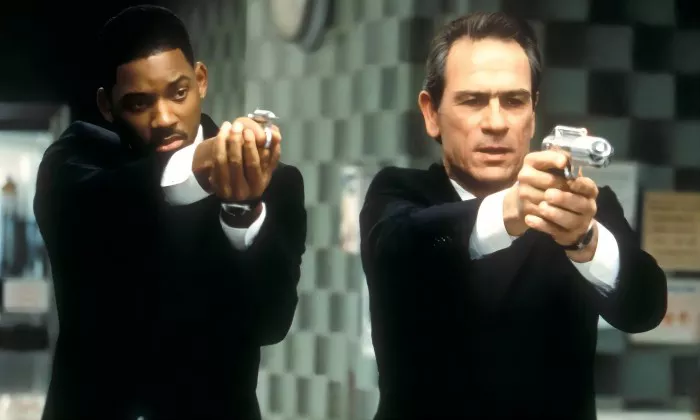“Men in Black,” the 1997 science fiction comedy directed by Barry Sonnenfeld and based on Lowell Cunningham’s comic book series of the same name, is often interpreted as a satire due to its humorous take on various themes and tropes commonly associated with the science fiction genre. While the film certainly incorporates satirical elements, its classification as a full-fledged satire may be subject to interpretation. In this exploration, we’ll delve into the satirical aspects of “Men in Black” and examine how they contribute to the film’s overall tone and message.
1. Satirical Elements in “Men in Black”:
“Men in Black” employs satire to parody and critique various aspects of contemporary society, including bureaucracy, government secrecy, and xenophobia. The film’s portrayal of the titular organization, a clandestine government agency tasked with monitoring and policing extraterrestrial activity on Earth, satirizes the inefficiency and absurdity of bureaucratic institutions. From the comically mundane tasks assigned to its agents to the convoluted rules and regulations governing their operations, the Men in Black organization serves as a humorous caricature of government bureaucracy run amok.
2. Critique of Government Secrecy:
Another satirical element in “Men in Black” is its critique of government secrecy and the suppression of information. The film’s premise revolves around the idea of a hidden world of aliens living among us in disguise, with a secret government agency tasked with maintaining the illusion of normalcy and preventing public panic. This satire of government secrecy reflects real-world concerns about the lack of transparency and accountability in government operations, as well as the potential consequences of withholding information from the public.
3. Parody of Science Fiction Tropes:
“Men in Black” also parodies and subverts various science fiction tropes and conventions, adding a layer of satire to its genre elements. The film’s portrayal of aliens, for example, eschews traditional depictions of extraterrestrial life in favor of whimsical and imaginative creature designs that defy expectations. From the tiny, squid-like aliens known as “worm guys” to the towering, insectoid Edgar the Bug, the film’s aliens are both fantastical and absurd, serving as a humorous commentary on the limitations of human imagination and the conventions of the genre.
4. Commentary on Xenophobia and Otherness:
At its core, “Men in Black” offers a satirical commentary on xenophobia and the fear of the “other.” The film’s premise of a hidden world of aliens living among us reflects real-world anxieties about immigration, cultural diversity, and the unknown. By portraying aliens as ordinary individuals with their own quirks and personalities, the film challenges stereotypes and prejudices, encouraging viewers to embrace diversity and celebrate difference rather than fear it.
5. Subversion of Expectations:
One of the hallmarks of satire is its ability to subvert expectations and challenge established norms. “Men in Black” accomplishes this through its irreverent humor, clever wordplay, and unexpected plot twists. From the revelation that Elvis Presley is alive and well and working as a postal clerk to the revelation that the Earth is just one of many intergalactic immigration checkpoints, the film constantly surprises and delights viewers with its inventive and subversive storytelling.
Conclusion:
In conclusion, while “Men in Black” incorporates satirical elements to parody and critique various aspects of contemporary society and the science fiction genre, it may not be considered a full-fledged satire in the traditional sense. Instead, the film blends humor, action, and imagination to create a unique and entertaining cinematic experience that resonates with audiences of all ages. Whether it’s poking fun at government bureaucracy, critiquing secrecy and xenophobia, or subverting genre conventions, “Men in Black” offers a witty and insightful commentary on the human condition and the absurdities of modern life.
Related Topics:
Men in Black (1997) Film Review

